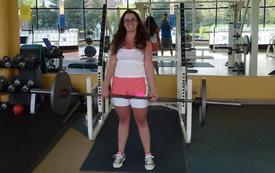We are pleased to announce that as of March 4, 2025, an updated Rich Text Editor has been introduced in the MyFitnessPal Community. To learn more about the changes, please click here. We look forward to sharing this new feature with you!
why don't strength calories count?

Foutlaw77
Posts: 15 Member
Maybe this is covered somewhere, but why don't the calories for my strength training count? I feel like all of those lunges and crunches should count for something.
Thanks!
Thanks!
0
Replies
-
0
-
I think there is a "strength training" option to log in under the cardio section. Sure seems like I am working harder than the calories they tell me though.....0
-
same here. I would love to know.0
-
I think there is a "strength training" option to log in under the cardio section. Sure seems like I am working harder than the calories they tell me though.....
agreeed!0 -
I think it is because strenght trainig doesn't burn very many calories in the moment of training, but in the long term they build muscle which burns so much more calories than not having done strenght training.. so keep up the lunges!0
-
I think there is a "strength training" option to log in under the cardio section. Sure seems like I am working harder than the calories they tell me though.....
Yes, count them under cardio so you have something as a kind of place holder, but nothing can really estimate these calories accurately. The point of strength training is less calorie burned and more overall fitness and shape. The burn will be lower but fueling the muscle gain will keep your metabolism running high throughout the day- even when you don't work out.0 -
I want to respond to this thread because I feel like a lot of people (esp women) will shy away from strength training because of the misconception that they can't burn as many calories there as on the cardio machines.
Speaking as a physical therapist and personal trainer here, strength training burns a TON of calories if you're doing it vigorously (difficult at 10 reps per set or less) and doing compound movements (like squats, deadlifts, lunges, bench press, and rowing among others, which move multiple joints and muscle groups at the same time.
A 130 lb woman burns about 375 cal/hr with vigorous strength training according to the commonly referenced charts charts but per research I've read, it may be as much as 50-100% more than that in reality. This is because all of those charts were based on calorimetry readings which only measures calorie burn based on oxidative fueling.
Let's skip the Krebbs cycle and all of the relevant chemistry and just say this: when you're activating other fueling systems (glycolytic, phosphagenic) using ANaerobic activity (high intensity, short duration, like sprints or vigorous lifting) you're
1) burning (50-100%) more calories than the charts can account for
2) elevating your metabolic rate for hours after doing so, hence burning more calories for the next several hours of your life, even if you spend them at your desk.
3) Finally, yes, the true RMR also increases long term from the added muscle mass which is great.
For a really well written book on the subject I frequently recommend The New Rules of Lifting for Women by Lou Schuler. Terrible condescending title but really great book. Also, the author is the first to point out that the rules are neither new nor gender based but he had to title it something to get our attention. Can't fault him there. Good research, good ideas.
Don't even get me started on the "fat burning zone" of low intensity cardio.0 -
marking to read later0
-
Don't even get me started on the "fat burning zone" of low intensity cardio.
I read that the low-intensity cardio "myth," if you want to call it that, comes because during those sessions you'll burn a higher percentage of fat calories vs. other calories. Of course, if you have a short, vigorous session, you'll burn more calories overall, and thus more fat calories.
Thanks for the other info re: weight training. I struggle with the calorie part. I know I need to recover afterward but I'm so afraid of going over my 1200 calorie limit for the day. Stupid since I don't eat right anyway.0 -
Very interesting information. Thank you0
This discussion has been closed.
Categories
- All Categories
- 1.4M Health, Wellness and Goals
- 394.6K Introduce Yourself
- 44K Getting Started
- 260.5K Health and Weight Loss
- 176.1K Food and Nutrition
- 47.5K Recipes
- 232.7K Fitness and Exercise
- 444 Sleep, Mindfulness and Overall Wellness
- 6.5K Goal: Maintaining Weight
- 8.6K Goal: Gaining Weight and Body Building
- 153.1K Motivation and Support
- 8.1K Challenges
- 1.3K Debate Club
- 96.4K Chit-Chat
- 2.5K Fun and Games
- 4.1K MyFitnessPal Information
- 16 News and Announcements
- 1.3K Feature Suggestions and Ideas
- 2.8K MyFitnessPal Tech Support Questions







